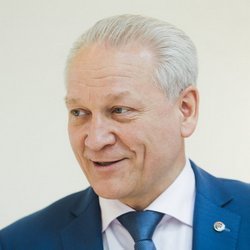Pandemic brings Yelabuga’s Sollers Ford public contracts at 5 billion
Russia’s Ministry of Industry and Trade has purchased large batches of ambulance cars and school buses from the Tatarstan enterprise
As Realnoe Vremya has learnt, Sollers Ford LLC in Yelabuga has earned nearly 5 billion rubles in 2020 amid the pandemic from supplies of ambulance cars and school buses to Russia’s different regions — from the Republic of Komi to Crimea. It is almost four times more than last year. The Russian Ministry of Industry and Trade has become the main client of the enterprise that recently manufactured its 90,000th Ford Transit. Read in our report how products of the Tatarstan automotive industry turned out to be beyond compare, causes of a surge in supplies and who waits for the new minibuses made in Yelabuga the most.
Quadrupled sales
In 2020, the Russian Ministry of Trade and Industry has purchased different modifications of Ford Transit school buses for 647,85 million rubles and namesake ambulance cars for 4,198 billion. This is nearly four times more than a year ago when ambulance cars for 1,237bn in total were purchased from the enterprise via public contracts.
Unlike last year when all purchases were made in November, the first contracts on supply of ambulance cars were signed in late April, the last deals were sealed in September. Contracts on the supply of school buses were traditionally signed during November.
All purchases have been made without competition — from the only supplier. The ambulance cars have been bought according to the decree of the Government of the Russian Federation as of 11 July No. 1806-r, which was issued due to the COVID-19 pandemic, while the school buses have been purchased according to the government’s decree No. 2525-r as of 1 October 2020 in a programme supporting the Russian automotive industry that is in decline. Open sources suggest that the market of commercial cars — lorries, vans and microbuses — dropped by 42,6% in spring 2020 amid the coronacrisis.
The Ministry of Industry and Trade has purchased the vehicles from Sollers Ford LLC in small batches — from 1-2 to 30-40. According to the roster of public contracts, the orders had to be divided for “geographical” reasons: the terms of contracts include not only a supply of certain cars and modification but also their delivery to the place where they will be used. And these places are scattered on the map of huge Russia.
So 17 Ford Transit ambulance cars (3,88m rubles each) for 65,96 million rubles have gone to Primorye Krai. The same quantity of cars but in a cheaper standard modification for 3,76m rubles per car has travelled to Kaliningrad Oblast for 63,92m in total. Krasnodar Krai has got 21 cars for 4,22 million rubles per car — 88,62m in total. Bashkortostan has received the same number of cars for 4,34m rubles per car — 91,14m rubles in total.
While Russia’s Federal Medical and Biological Agency has purchased 42 cars for 4,89 million per car and a total of 205,38m rubles. These cars have spread across the country — from Moscow, Sarov and Tver to Murmansk, Sverdlovsk, Stavropol, Chelyabinsk Oblasts.
November tender with supplies for schools
The much cheaper school buses (the ambulance cars are more expensive because of the medical “filling”) also have gone to different regions. For instance, 30 buses for 13-20 people for 2,28m rubles (68,4m) have headed to Bashkortostan. 20 buses with a capacity of 21-24 people for 2,385m (47,7m rubles) have travelled to Stavropol Krai. Volgograd Oblast has received 4 buses for 13-20 people and 10 buses for 21-24 people, for 32,97m rubles in total.
13 buses for 31m rubles have been purchased for Ulyanovsk Oblast, 19 vehicles for 45,315m for Crimea, 20 buses for 47,7m for Stavropol Krai, 7 vehicles for 16,69m for Kabardino-Balkaria, 14 for 33,39m for Leningrad Oblast. While Orlov and Voronezh Oblasts will get a school bus each for more than 2 million — the simplest one.
Time-tested?
The Russian Ministry of Industry and Trade hasn’t passed the manufacturer’s region by. This year Tatarstan will get 17 ambulance cars for 71,74m rubles and 23 school buses for 54,96m (11 buses for 13-20 seats and 12 with a capacity of 21-24 people), the vehicles have been purchased with the Reserve Fund’s money.
The federal ministry hasn’t yet answered Realnoe Vremya’s question why it was decided to buy precisely Yelabuga Fords for the needs of the ambulance and schools without any alternative. The enterprise itself considers that its products don’t almost have an alternative in Russia:
“The current situation in the world explains the surge in demand for ambulance cars. Doctors in different regions of Russia have been using our cars for many years,” the press service of the factory said. “The same is about school buses: we supply school buses to different regions of Russia year after year. Our buses passed the exam in practice and deserved the reputation thanks to their quality. Purchases this year have been made to support the automotive industry.”
Moreover, the enterprise claims that retail and corporate clients are the main consumers: “The share of public contracts (Editor’s Note: in the total number of manufactured cars) has just insignificantly increased this year compared to last year and has been 11% of the total quantity of cars sold in late November. Retail sales and orders of corporate clients are the main part of Ford Transit vehicles that were manufactured and sold”.
If not the pandemic
As State Duma deputy from Tatarstan, ex-Minister of Health Care of the republic Ayrat Farrakhov thinks, the sudden rise in ambulance car purchases because of the high demand for them amid the coronavirus pandemic will benefit health care in general: This sector hadn’t been chronically receiving enough funding for many years, it was not always possible to change the car fleet”. This is why, according to him, if not the pandemic, there would not have been such explosive growth of the number of patients, ambulance cars were anyway necessary because the fleet of ambulance cars was old.

“Now the plant in Yelabuga has a very good localisation level, not only cars but also engines are manufactured here, which I think provide room for manoeuvre with prices. They have rivals, of course, Mercedes and Volkswagen vehicles are manufactured in Nizhny Novgorod. For Fords have a better quality even though the prices are the same,” thinks Chairman of Tatarstan’s Mechanical Engineering Cluster Sergey Mayorov.
Moreover, Mayorov stressed that the world economic situation played into the Yelabuga manufacturers’ hands — a weaker ruble provided them with an advantage compared to importers, an opportunity to outstrip their foreign opponents in terms of prices:

No matter how many cars are bought, it’s not enough
However, no matter how many cars are supplied for the needs of health care, their number is certainly not sufficient during the pandemic. According to Ayrat Farrakhov, there are problems not only with the presence of cars but also their supply with fuel, POL. As he gave us to understand, health care establishments should have enough money for petrol in 2021:
“The budget of Compulsory Medical Insurance will increase by 13% next year, that’s to say, the tariff includes these costs. Apart from the ambulance, there are doctors, and there aren’t enough vehicles to transport them. Today polyclinics need sponsorship support from taxi fleets, simply people’s voluntary assistance who are ready to use their car for 2-3 hours to reduce a doctor’s time he spends to go home, go to work, to patients so that the doctor can pay more attention to patients, spend time on their treatment, not to get to them”.
A big subsidised company owned by a Dutch company
Sollers Ford LLC registered in Alabuga SEZ is a big enterprise with 5,475m rubles of authorised capital. The headquarters of the firm — Ford Sollers Netherlands B.V. — is based in the Netherlands (Ford Sollers Holding LLC in Naberezhnye Chelny is the founder of Sollers Ford LLC, the Dutch company is the benefactor of the holding).
Sollers Ford JV is a joint venture of Ford Motor Company and Russian Sollers PJSC created in 2011. Last year, Ford Motor Company left the Russian market of passenger cars, while Vadim Shvetsov’s Sollers got the controlling interest (51%). The factors of the JV closed except for Ford Transit in Yelabuga with a capacity of 85,000 vehicles a year. The Tatarstan factory manufactured 12,589 Ford Transit cars in 2019 alone, while 90,000 cars of this brand have been made on the local conveyor belt in 8 years.
Sollers Ford LCC’s revenue in 2019 totalled over 33bn rubles, says SPARK-Interfax. However, the previously profitable company ended the last year with 2,66bn of net loss.
This year, the company has signed 150 public contracts for 4,846bn rubles. It has received almost 4,75bn rubles of subsidies from the federal budget in the last two years — 970,5m and 570m rubles in 2019 and almost 3,21bn in 2020.